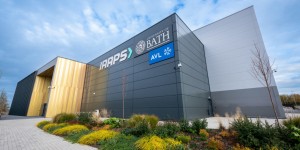Bristol is to play a key role in a pioneering project to make clean hydrogen-fuelled buses a reality – helping support hundreds of jobs and saving millions of tonnes of CO2.
The Institute for Advanced Automotive Propulsion Systems (IAAPS), pictured, on the Bristol and Bath Science Park has been selected as a strategic partner in the £12.7m initiative – the latest in a string of projects it is involved in aimed at demonstrating the versatility of the so-called fuel of the future. 
Set to run for 30 months, the Hydrogen Electric Integrated Drivetrain Initiative (HEIDI) project will produce a fuel cell/battery hybrid powertrain for use on a double-decker bus.
It will be cheaper than the equivalents currently available for large vehicles and is set to use innovative new electronics and energy recovery technologies.
The project is not only expected to support almost 500 jobs over the next 10 years but also provide CO2 savings of 5.9m tonnes.
Key aspects of the testing and validation process will be conducted at the £70m state-of-the-art IAAPS research and innovation centre, which is owned by the University of Bath.
The project is being funded by £6.3m from the University of Warwick-based Advanced Propulsion Centre and will support its ambitions to build an end-to-end supply chain for zero-emission vehicles (ZEVs) in the UK. It has been matched by industry to a total of £12.7m.

IAAPS and the University of Bath, along with Warwickshire-based compressor supplier Aeristech and electric powertrain provider Equipmake, based in Norwich, will support Crawley-headquartered fuel cell specialist Bramble Energy, which leads the project, in developing a hydrogen fuel cell-powered bus.
IAAPS and Bath researchers will initially model a fuel cell propulsion system for the bus but will research whether it could be used in other types of vehicles.
In project’s second half, the fuel cell system will be tested at the IAAPS, connected to a virtual model of different vehicle and powertrain designs to assess its performance.
This will help produce new experimental approaches for specialist testing of fuel cells with virtual powertrains and/or vehicles.
IAAPS academic director Prof Richard Burke said: “This project will represent a major step towards commercialisation of affordable hydrogen fuel cell vehicles.
“Whilst hydrogen will not solve all our mobility challenges, it certainly has a significant role to play across many vehicle types and the HEIDI project will demonstrate its use as complement to battery electric vehicles.
“For IAAPS, this project is significant as it represents the first opportunity for us to test a full fuel cell system, progressing our research from air handling and simulation of the stack to full system experimentation.”

Lecturer in Electrified Automotive Propulsion Systems Dr Tom Fletcher, who is leading the project at IAAPS and the university, added: “Two strategic hurdles for fuel cell powertrains are development cost and lifetime uncertainty.
“By embedding digital innovation, the HEIDI project will accelerate the development of future fuel cell powertrains. This project will serve as a template for sustainable and equitable mobility solutions.”
HEIDI is the latest hydrogen project involving the University of Bath and IAAPS.
Work started in March on a hydrogen innovation centre at IAAPS to help tackle the research challenges blocking the commercial use of green hydrogen, focusing on transforming industries that are difficult to decarbonise such as transport, heating and steel which together make up about 90% of all UK greenhouse gas emissions.
Last December IAAPS launched a strategic partnership with aircraft parts manufacturer GKN Aerospace to develop and validate novel hydrogen technology to help decarbonisation the aviation industry.






























